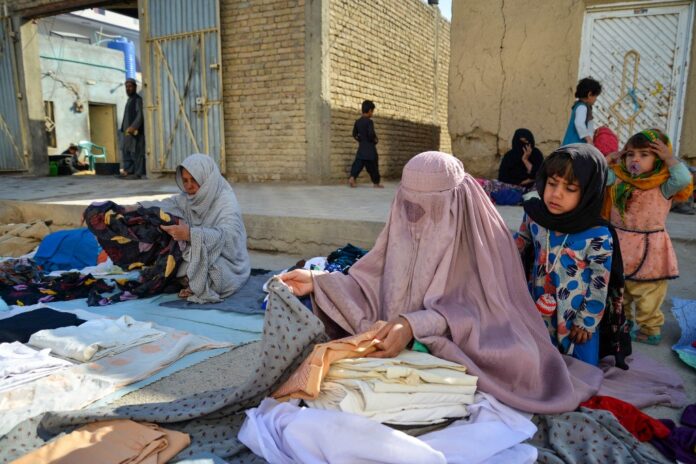NEW YORK: The UN Security Council on Thursday adopted a draft resolution calling for a team of independent experts to assess the international strategy on Afghanistan, and develop a “coherent and integrated approach” to address the challenges facing the country.
Resolution 2679 was authored by the UAE and Japan, the two penholders of the Afghan file at the Security Council.
The two countries also authored a second resolution extending the mandate of UN assistance mission to Afghanistan for another year, until March 17, 2024.
Both resolutions were adopted unanimously.
Lana Nusseibeh, the UAE’s permanent representative to the UN, told Arab News after the vote that “there is an extraordinary set of circumstances in Afghanistan today, and we needed an extraordinary response from the council. So, I hope this (resolution) contributes to that effort.”
The penholders, who are responsible for following up on the humanitarian situation in Afghanistan by drafting resolutions, requesting emergency meetings, and organizing mission visits, have argued that there is a need for a coherent international political strategy, and that maintaining the status quo will not lead to positive development on the ground.
The resolution highlights the importance of the full, equal and meaningful participation of women and upholding human rights, including those of women, children, minorities, and people in vulnerable situations.
It also expresses concern at the lack of progress on the Security Council’s expectations for the Taliban.
The text requests that the secretary-general provide an independent assessment to the council by Nov. 17 this year, following consultations with “all relevant Afghan political actors and stakeholders, including relevant authorities, Afghan women, and civil society, as well as the region and the wider international community.”
The assessment must include recommendations for an “integrated and coherent approach” among relevant political, humanitarian, and development actors within and outside the UN system “in order to address the current challenges faced by Afghanistan, including in relation to human rights, the rights of women and girls, religious and ethnic minorities, economic and social challenges, dialogue, governance and the rule of law; and to advance the objective of a secure, stable, prosperous and inclusive Afghanistan.”
Nusseibeh told fellow council members after the vote that “in requesting this assessment, the Security Council is not only demonstrating its deep concern with the alarming trajectory in Afghanistan, but also choosing to do something about it.”
She added that “without a persistent and coordinated international effort, the status quo that contributed to the worst women’s rights crisis in the world is likely to continue.
“If we all share the objective of a secure, stable, prosperous, and inclusive Afghanistan — and we believe that today we’ve shown that we do — then we all must be working toward the same objective, in unity.
“The scale of the crisis demands a departure from business as usual,” said Nusseibeh, adding that “the work truly begins now.”
Ishikane Kimihiro, Japan’s permanent representative to the UN, welcomed the unanimous adoption of the two resolutions, and said the council’s support for the UN assistance mission comes at a time of “enormous challenges confronting Afghanistan and its people, including the dire humanitarian and economic situation, the persistent threat of terrorism, and above all, the depreciation of opportunities for women and girls in education and employment.”
Nusseibeh said the council’s unanimous extension of the UNAMA’s mandate highlights its “strong and unified message: Afghanistan, and in particular its women and girls, will not be abandoned.”
Taliban fighters took control of the capital, Kabul, on Aug. 15, 2021, after US and NATO forces withdrew from Afghanistan after 20 years of war. They have since then enacted a series of edicts denying women and girls access to education beyond the sixth grade, and banning women from working for humanitarian organizations, among other restrictions of their rights.
Multiple international efforts to persuade the Taliban rescind their bans have failed.
One effort earlier this year was led by Amina Mohammed, deputy secretary-general of the UN, who told Arab News after her visit to Afghanistan that “it is important to maximize whatever leverage is available to steer the Taliban toward the universal principles that underpin participation in the international community.”
Mohammed had called on all countries “to unite in their efforts to put pressure on the Taliban to modernize and move from the 13th century to the 21st.”

